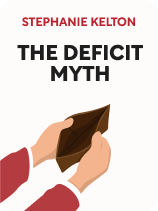

This article is an excerpt from the Shortform book guide to "The Deficit Myth" by Stephanie Kelton. Shortform has the world's best summaries and analyses of books you should be reading.
Like this article? Sign up for a free trial here .
What is Stephanie Kelton’s The Deficit Myth about? How was the book received by critics?
In The Deficit Myth, economist Stephanie Kelton—a former Senate Budget Committee staffer and 2016 campaign adviser to Bernie Sanders—writes that nearly all of the public discourse about national debts and deficits gets the facts entirely wrong. Naturally, a controversial stance like this attracted a lot of criticism.
Continue reading for a brief overview of The Deficit Myth.
Overview of the Book
A leading proponent of the heterodox economic school of thought known as Modern Monetary Theory (MMT), Stephanie Kelton argues that it is incorrect to think of the U.S. federal government as “needing” money to pay for its spending. Because the government is the sole supplier of U.S. dollars, it can simply create them anytime it needs more dollars to pay for something.
This idea of the federal government as a currency issuer instead of a currency user is central to Stephanie Kelton’s The Deficit Myth, in which she champions more aggressive deficit spending by arguing that the U.S. government could finance any program it wishes to create. Kelton advocates a more holistic view of the economy—arguing that we ought to focus on poverty reduction, combating climate change, and building a more just and equitable society as the true measures of economic success, rather than focusing solely on the narrow budgetary impacts of legislation.
Kelton’s argument rests on these key principles:
- The federal government doesn’t need to balance its budget like a household.
- The risk of inflation—not deficits—represents the real threat to economic growth.
- The national debt isn’t a threat to our society or economy.
- The trade deficit doesn’t have to lead to job loss and unemployment.
- Social spending programs like Medicare and Social Security are not in danger of going broke.
- We should implement a federal jobs guarantee to secure the fundamental right of every person who wants a job to have one.
Criticism and Praise
The Deficit Myth is a controversial book in the economics world and has drawn a fair number of critics and detractors since its publication in 2020.
A Wall Street Journal review claimed that Kelton offers little evidence for her view that there is always slack—in other words, unemployed labor or idle capital—in the economy, and that therefore new federal spending will almost never lead to inflation. The Journal review also observed that Kelton offered no hard numbers for just how much the robust spending programs she champions (including a federal job guarantee, nationwide infrastructure package, and free college tuition) would actually cost—leading the reviewer to doubt that the country has enough untapped capacity to finance these programs without sparking runaway inflation. Finally, the review noted that Kelton cites no works of serious scholarship to support her ideas and ignores historical examples in which economic doctrines similar to hers were tried and did indeed result in inflation, depression, and unemployment.
However, The Deficit Myth also received its share of praise. The London School of Economics Review of Books celebrated Kelton’s work as a paradigmatic shift in economics thinking—shattering the idea that fiscal deficits are inherently irresponsible and moving the conversation toward an acceptance of deficits as a necessary (and possibly even morally righteous) tool for creating a better society.

———End of Preview———
Like what you just read? Read the rest of the world's best book summary and analysis of Stephanie Kelton's "The Deficit Myth" at Shortform .
Here's what you'll find in our full The Deficit Myth summary :
- A look at national debt through the lens of Modern Monetary Theory
- How public discourse about national debts and deficits gets the facts wrong
- Why MMT says the U.S. government could finance any program it wishes to create






